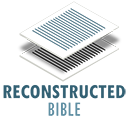This Bible Study Technique Will Blow Your Mind!
/You've probably never heard of this method of Bible study, but it can give you incredible insight and understanding of the Bible verses that you care about the most. If you know what to look for, some of the mysteries of Scripture can be solved. It has totally changed the way I look at the Bible and I'm glad it did. It's called mirror-reading.
The Bible Will Make More Sense To You
Comedian, Bob Newhart, has a hilarious sketch where he pretends to be an air traffic controller. He speaks to several different pilots but we only hear Newhart's side of the conversation. Even with half of the conversation missing, we can still understand the conversation to great comedic effect. How can that be? Because we can infer the rest of the conversation by what Newhart says. We may not know exactly what the pilots said but we know enough to understand.
Mirror-reading can help us fill in the "gaps" of the Bible. There's an interesting post going around on social media that highlights our ability to be able to fill in the gaps. You may have seen it before, but those of you who haven't can read it below:
“Aoccdrnig to a rscheearch at Cmabrigde Uinervtisy, it deosn’t mttaer in waht oredr the ltteers in a wrod are, the olny iprmoatnt tihng is taht the frist and lsat ltteers be at the rghit pclae. The rset can be a toatl mses and you can sitll raed it wouthit porbelm. Tihs is bcuseae the huamn mnid deos not raed ervey lteter by istlef, but the wrod as a wlohe.”
Our minds automatically try to fill in the missing pieces of information. We do this even when we read the Bible. The question is, what are you filling in the gaps with? Are you inferring the other half of the conversation or @@are you filling the gaps in with your predetermined theology?@@
It is said that theologian F.F. Bruce spoke of Paul's letters by saying "Reading the letters of Paul is like hearing one side of a telephone conversation." @@The Bible is not a theological dissertation.@@ It is made up of various genres, including narratives, epistles and proverbs. The Bible was not written in a vacuum but was written to specific situations and was responding to particular things that were being said. If we approach Scripture as if it were a theological dissertation, we assume there is no other half of the conversation. When that happens, we miss out on the full meaning of the text and our understanding suffers.
Just like we can infer what is said by what Newhart says, we can sometimes infer what was being said by what the Biblical authors wrote in Scripture.
Here's How To Mirror-Read
Mirror-reading can be a complex and sophisticated way of studying the Bible but if you're just starting out, here are 3 simple steps.
1. Read it over and over and over
When you pick a book of the Bible to study, you must read it repeatedly. You want to become familiar with themes, phrases and even words that are repeated throughout the book. This familiarity will help you when you're looking for other verses to verify (see step 3) your mirror-reading.
2. Ask the opposite
When reading a verse, ask the opposite of what it says. Take Ephesians 1:1 for example:
“Paul, an apostle of Christ Jesus by the will of God, To the saints who are in Ephesus, and are faithful in Christ Jesus:”
Most people blow through this verse and see it as a simple introduction, without any idea of the insight that can be mined from it.
Were there false teachers in Ephesus saying:
- Paul was not an apostle of Christ Jesus?
- Paul was not an apostle by the will of God?
- They were not saints in Ephesus?
- The saints were not faithful in Christ Jesus?
These are all questions that we could ask to help us get started on mirror-reading Ephesians 1:1. However, we can't leave it at that.
3. Verify
Whatever questions we ask, we need to verify it with additional evidence, preferably from the same book that is being studied. Without additional evidence, our mirror-reading becomes more speculative and dangerous teachings could arise from misunderstanding the text.

